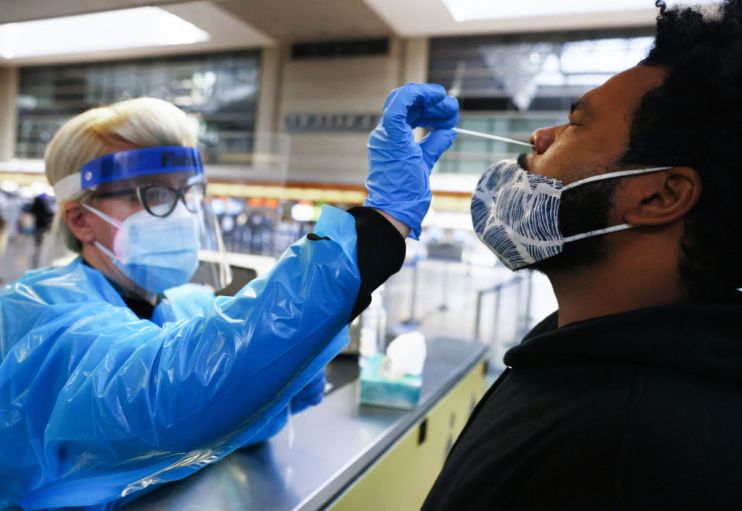Mandatory testing is the boost the travel industry needs

Lockdown 3 has once again decimated the travel industry. There is a total ban on foreign trips except for very specific reasons such as work or urgent medical or compassionate need.
We are in a total mess but there is one clear way out.
The government needs to act quickly and introduce stringent Covid testing for all people arriving back in the UK. This should be a negative PCR test taken within 72 hours of departure – a move which would bring us into line with most other countries including Greece, France and Germany.
Read more: Airport bosses call for Government to fund mandatory testing
This is something the travel industry has been campaigning for since early in the pandemic and without this necessary step I worry about the future of the UK travel sector.
I was already well aware of the problems around testing but I saw things for myself first hand earlier this week and it left me shocked.
I flew back into Heathrow from Pakistan and there were no testing procedures in place whatsoever. I was able to stroll through passport control before returning to my life in the UK.
While I was at the airport there were passengers flying in from other territories including Egypt, Dubai and Indonesia – none of whom were tested either.
However, when I had flown out to Pakistan I had to provide a negative Covid PCR test and have my temperature taken. Without showing that negative test result I would not have been allowed to board the flight. This was exactly the same when I flew there months ago. Yet nothing has changed on the UK side in the meantime.
At the moment the UK is totally out of step with almost every country in the world. Most places demand a negative test – if they will let you in at all. Plenty of countries currently have a total ban on arrivals from the UK.
It is incomprehensible to me why some of the poorest countries in the world were extremely quick to introduce mandatory testing, whilst the UK continues to have some of the most lax measures. Perhaps this goes some way to explain why we are now reporting over 1,000 deaths a day, the highest figures since last April.
Under the current UK rules, new arrivals simply fill out a passenger locator form and then you go into voluntary quarantine for ten days – unless the country you came from is part of a travel corridor.
You are also exempt from quarantine if you are in certain jobs including aerospace engineers, pilots, bus drivers, business directors, elite sportspersons, journalists, postal workers and performing arts professionals.
In December, the Government launched the Test to Release scheme which allows travellers to end self-isolation earlier should they get a negative coronavirus test five days after arrival.
However, the system has been a disaster. The Government did not even provide a list of approved testing companies until the day the programme was introduced. Taking a test is also expensive with costs ranging from £60 to over £200.
According to the Labour Party, the system was already pretty shaky. They uncovered data which showed that the Isolation Assurance Service failed to contact more than 1.9million of the two million passengers spot checked by Border Force between June and September.
The Prime Minister has been hinting this week that he may introduce testing for UK arrivals. He needs to get a move on and do it. This is not a time for delay. We need urgent action and we need a comprehensive testing programme in place as soon as possible. We need testing to be widely available and for it to be cheap if not free.
One way to bring the cost down is to introduce batch testing. Up to ten people can be tested at one time. If someone tests positive then you can test individuals. Although, in reality, if a family received a positive result the whole family would simply not travel. That could potentially speed up the process and make things cheaper.
Read more: Government looking at negative PCR testing for air travellers
There are two reasons why we need robust testing in place. The first is simply for public health. As we saw from the recent arrival of a new highly infectious strain of Covid from South Africa, the current system presents no barrier to coronavirus. We need the data and the measures in place to be able to track the virus.
The other benefit would be to restore faith in air travel and to provide a longer-term solution to living with coronavirus. Even a mass rollout of vaccines will not solve everything. We have to learn to live with the virus for the foreseeable future. We need processes in place which we can rely on and which will allow people to travel to and from the UK with confidence once again.
It is also important to explore how we can bring UK nationals home if they test positive prior to departure. This is a tricky area but perhaps airlines could provide a Covid secure area on planes to repatriate passengers so they are not left stranded and sick.
This new lockdown could not have come at a worse time for airlines, airports and our associated trades (and of course for so many other industries and people too).
We were just starting to see some optimism return to the travel sector with people encouraged by the vaccine roll out. Families were slowly starting to book summer holidays again and things were looking up after many months of misery. Decisive action now from the government can help to preserve the future for travel.